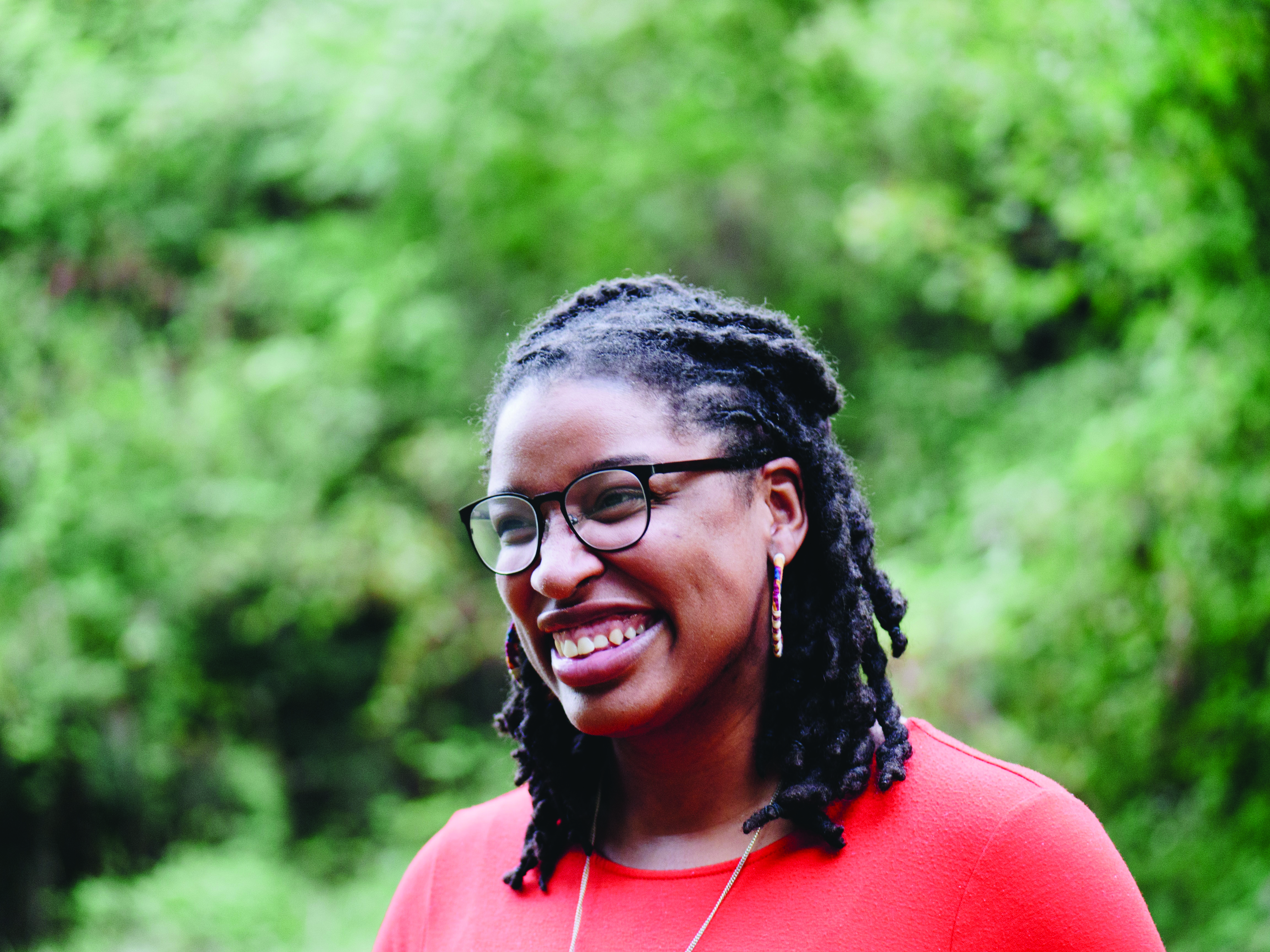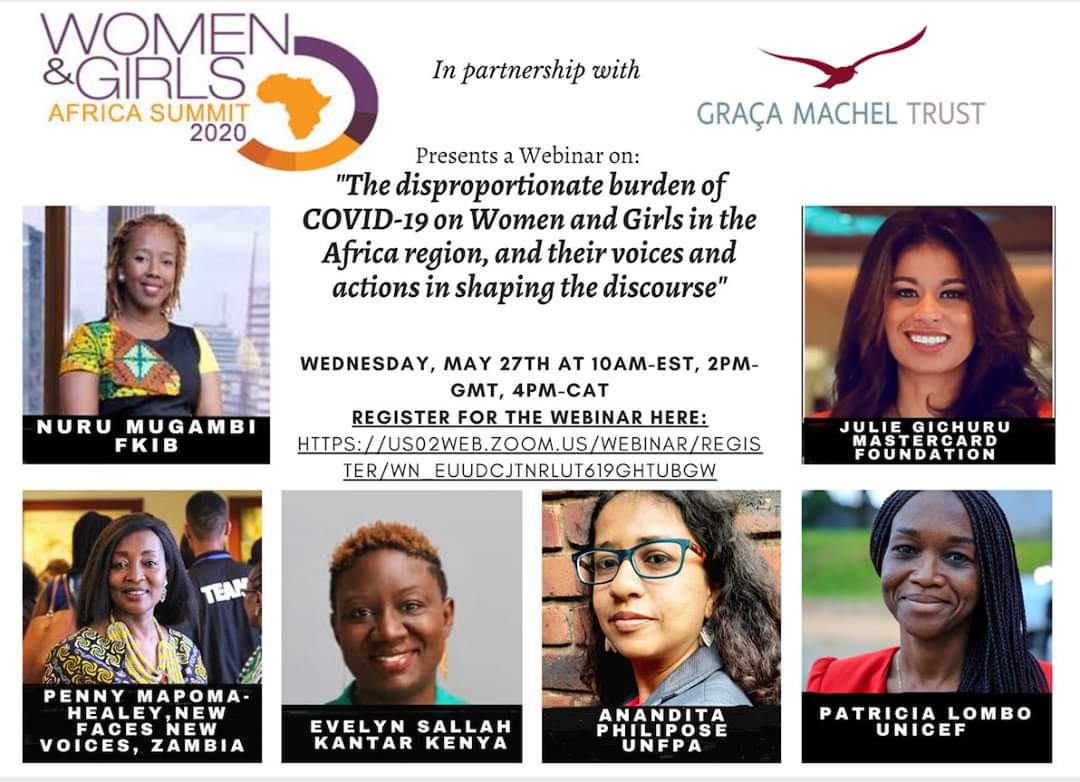2020 marks the twenty-fifth anniversary of the Beijing Platform for Action, a platform intended to advocate for the political, economic and social advancement of women and girls. However, the advent of the COVID-19 pandemic poses a threat to the gains made under the Beijing Platform for Action. This may significantly disrupt actions geared towards tackling existing gender inequalities. Previous experiences from times of crisis and past pandemics have taught us that women and girls experience these disproportionately, COVID-19 is no different.

Photo Credit: Unsplash.jpg Image
According to reports from the Johns Hopkins University, as of 1 June 2020, Africa had a recorded 149 822 confirmed positive cases of COVID-19 and a total of 4270 deaths. Recently, many African countries have established presidential COVID-19 task forces of public health and sectoral experts to respond to both the health challenges and the socio-economic challenges presented by the pandemic. The establishment of the respective presidential COVID-19 task forces by African leaders has brought to the forefront the value of evidence-based planning and has signalled strong regional co-operation.
Echoing from the words of the World Health Organization (WHO) Executive Director, Health Emergencies Programme, Dr Michael Ryan, “…one of the great things in emergency response and even [as someone] who is involved in emergency response will know this; if you need to be right before you move, you will never win, perfection is the enemy of the good when it comes to emergency management…the greatest error is not to move.”
The pandemic poses unique challenges for the women and girls’ movement. The aforementioned is primarily premised on the lessons learned from previous pandemics and COVID-19, what this has done is to unveil the disproportionate burden on women and girls, and the significant disparities in social investment in our communities. It is thereof reasonable to advocate for a gendered lens in policy responses to the pandemic in the immediate-, medium-, and long-term.
The sentiments mentioned above were recently amplified in a webinar, co-convened by the Graça Machel Trust (GMT) and the Women and Girls Africa Summit 2020 (WAGS). The webinar sought to explore the disproportionate burden of COVID-19 on women and girls in the Africa region, and their voices in shaping the discourse and actions. Pertinent thematic areas discussed established that since the outbreak of COVID-19, the projected global catastrophic impact on women and girls over six months of lockdown will result in 31 million additional cases of Gender-Based Violence (GBV).

“Africa has the widest gender inequalities in the world, we need to work together to ensure women are not physically, psychologically or sexually harmed”- Evelyn Sallah.
The projections also indicate that 47 million women will be unable to access contraceptives, and it is estimated that there will be 7 million unwanted pregnancies. These projections reiterate the need to have Sexual Reproductive Health (SRH) services continue during lockdowns because, in the long-term, the impact of COVID-19 will have left an unprecedented humanitarian crisis. Past experiences from Ebola have taught us that the needs of women and girls were neglected, subsequently leaving a lot of work and additional challenges related to SRH.
Also equally worrying has been the closure of schools, in Africa, in terms of the Gender Parity Index (GPI) the primary school completion rates for boys has been higher than that of girls across the continent. Subsequently, the closure of schools will further compound the phenomenon of the girl child being left behind, thankfully in countries like Côte d’Ivoire, the United Nations Children’s Fund (UNICEF) realizes that girls face different risks, including the higher possibility of falling behind in their studies. As a response, UNICEF has prioritized remedial education for girls in Côte d’Ivoire during school closures.
Through this WAGS Webinar, it was highlighted that COVID-19 has pushed us all into the fourth industrial revolution, accelerating technologically driven knowledge-based economies as the new norm. However, we must question how Africa will innovate to bridge the digital divide for women and girls? In response to this dilemma Nuru Mugambi, an advocate for sustainable finance, drew us to what she calls the COVID-Kairos which is constitutive of: digitizing all government offices and services for full transparency; giving working weak legitimacy (documentation, policy) without over-taxation burden; gender-disaggregated data analysis on COVID economic stimulus policies; and addressing climate change. Nuru voiced that “…from a policy perspective, let’s get policymakers to track economic stimulus measures at a disaggregated gender data level. Coordinated policy interventions are key to cushion the economy at this time.”
What was evident from the discussion during the webinar is an urgent need to have national responses place women and girls at the centre, policy responses that do so will be more impactful in the long-term. Herein lie an opportunity and solutions to fundamentally change and ensure a meaningful reconstruction, while simultaneously tackling existing gender inequalities.
This blog was authored by Neo Mofokeng, Programmes Officer, (Women’s Economic and Social Advancement) The Graça Machel Trust










 The Trust supports and mobilises civil society networks on issues of ending child marriage, ending violence against children, ending female genital mutilation and promoting children’s rights, to carry out advocacy and action across Africa. Special focus is placed on Malawi, Mozambique, Tanzania and Zambia where child marriage continues to be a problem largely driven by poverty, gender inequality, harmful traditional practices, conflict, low levels of literacy, limited opportunities for girls and weak or non-existent protective and preventive legal frameworks.
The Trust supports and mobilises civil society networks on issues of ending child marriage, ending violence against children, ending female genital mutilation and promoting children’s rights, to carry out advocacy and action across Africa. Special focus is placed on Malawi, Mozambique, Tanzania and Zambia where child marriage continues to be a problem largely driven by poverty, gender inequality, harmful traditional practices, conflict, low levels of literacy, limited opportunities for girls and weak or non-existent protective and preventive legal frameworks.




 Education is a fundamental right for all children, which is also a vehicle for social, economic and political transformation in communities, countries and the African continent at large. Recent studies indicate a lack of progress in some of the critical commitments aimed at improving education quality, access, retention and achievement, particularly for girls. In most African countries, girls may face barriers to learning, especially when they reach post-primary levels of education. By implementing multi-dimensional approaches to education which includes core education, personal development, life skills and economic competencies, the Trust partners with funding partners, governments, civil societies and the private sector to improve education access.
Education is a fundamental right for all children, which is also a vehicle for social, economic and political transformation in communities, countries and the African continent at large. Recent studies indicate a lack of progress in some of the critical commitments aimed at improving education quality, access, retention and achievement, particularly for girls. In most African countries, girls may face barriers to learning, especially when they reach post-primary levels of education. By implementing multi-dimensional approaches to education which includes core education, personal development, life skills and economic competencies, the Trust partners with funding partners, governments, civil societies and the private sector to improve education access.

 The Nutrition and Reproductive, Maternal, New-born, Child and Adolescent Health and Nutrition, (RMNCAH+N) of the Children’s Rights and Development Programme aims at promoting the Global Strategy for women, children and adolescents’ health within the Sustainable Development Goals (SDG) agenda. The strategy emphasises on the importance of effective country leadership as a common factor across countries making progress in improving the health of women, children and adolescents.
The Nutrition and Reproductive, Maternal, New-born, Child and Adolescent Health and Nutrition, (RMNCAH+N) of the Children’s Rights and Development Programme aims at promoting the Global Strategy for women, children and adolescents’ health within the Sustainable Development Goals (SDG) agenda. The strategy emphasises on the importance of effective country leadership as a common factor across countries making progress in improving the health of women, children and adolescents. Through its Early Childhood Development (ECD) plan, The Trust will seek to put into action the new science and evidence Report that was presented by Lancet Series on Good and early development – the right of every child. This will be achieved by mobilising like-minded partners to contribute in the new science and evidence to reach all young children with ECD. The Trust’s goal is to be a catalyst for doing things differently, in particular, to rid fragmentation and lack of coordination across ECD sectors. In response to evidence showing the importance of political will in turning the tide against the current poor access and quality of ECD. Even before conception, starting with a mother’s health and social economic conditions, the early years of a child’s life form a fundamental foundation that determines whether a child will survive and thrive optimally.
Through its Early Childhood Development (ECD) plan, The Trust will seek to put into action the new science and evidence Report that was presented by Lancet Series on Good and early development – the right of every child. This will be achieved by mobilising like-minded partners to contribute in the new science and evidence to reach all young children with ECD. The Trust’s goal is to be a catalyst for doing things differently, in particular, to rid fragmentation and lack of coordination across ECD sectors. In response to evidence showing the importance of political will in turning the tide against the current poor access and quality of ECD. Even before conception, starting with a mother’s health and social economic conditions, the early years of a child’s life form a fundamental foundation that determines whether a child will survive and thrive optimally.